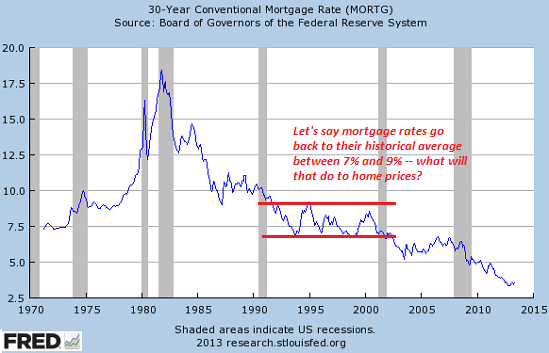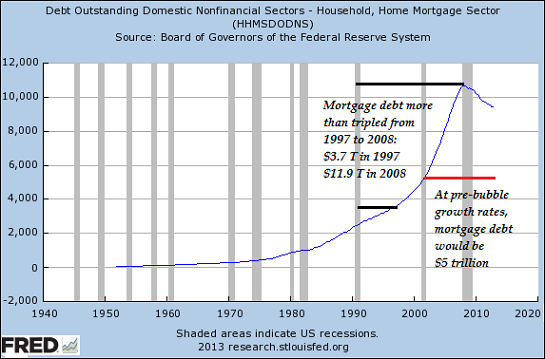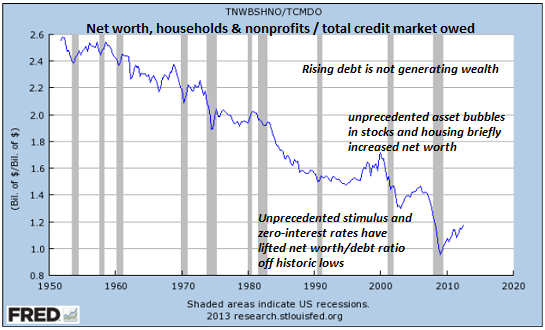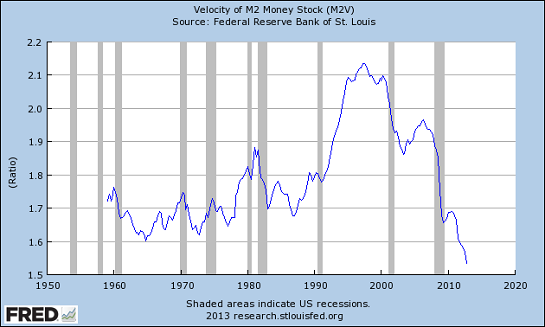Every Asset That Depends on Cheap, Abundant Credit (Housing, Bonds, Stocks) Is Doomed
Four words: financialization, debtocracy, diminishing returns.
About a month ago I asked What If Stocks, Bonds and Housing All Go Down Together? (May 24, 2013). Why would such an outrageous thought even occur to me?
Four words: financialization, debtocracy, diminishing returns. The entire global economy, developed and developing nations alike, is now dependent on cheap, abundant credit for everything: for "growth," for asset inflation, and ultimately for central state deficit spending, which props up all the cartels, rentier arrangements, fiefdoms and armies of toadies, lackeys, apparatchiks and embezzlers that suck off the Status Quo.
I have long endeavored to explain the harsh reality of neofeudal, neocolonial financialization: Neofeudalism and the Neocolonial-Financialization Model (May 24, 2012) and the neofeudal debtocracy that depends on low yields (interest rates) to enable enormous deficit spending: Why Krugman and the Keynesians Are Lackeys for the Neofeudal Debtocracy (April 24, 2013).
The wheels fall off the entire financialized debtocracy wagon once yields rise.There's nothing mysterious about this:
1. As interest rates/yields rise, all the existing bonds paying next to nothing plummet in market value
2. As mortgage rates rise, there's nobody left who can afford Housing Bubble 2.0 prices, so home prices fall off a cliff
3. Once you can get 5+% yield on cash again, few people are willing to risk capital in the equities markets in the hopes that they can earn more than 5% yield before the next crash wipes out 40% of their equity
4. As asset classes decline, lenders are wary of loaning money against these assets; if the collateral for the loan (real estate, bonds, stocks, etc.) are in a waterfall decline, no sane lender will risk capital on a bet that the collateral will be sufficient to cover losses should the borrower default.

In the golden age of growth from 1991 to 2002, mortgages rates bounced between about 7% and 9%. The band from 1970 to 1979 was about 7.5% to 10%.

You see what happens when debt becomes cheap and abundant: debt rises faster than wages or assets.

Household wealth may be rising, but what this chart reveals is debt is rising even faster--that's why the line is declining. Put another way, every dollar of new debt is generating less and less wealth.

It's called diminishing returns: every dollar of debt creates interest payments, but it's no longer doing households or enterprises any good. The Fatal Disease of the Status Quo: Diminishing Returns (May 1, 2013).
Things are falling apart--that is obvious. But why are they falling apart? The reasons are complex and global. Our economy and society have structural problems that cannot be solved by adding debt to debt. We are becoming poorer, not just from financial over-reach, but from fundamental forces that are not easy to identify or understand. We will cover the five core reasons why things are falling apart:
 1. Debt and financialization
1. Debt and financialization2. Crony capitalism and the elimination of accountability
3. Diminishing returns
4. Centralization
5. Technological, financial and demographic changes in our economy
Complex systems weakened by diminishing returns collapse under their own weight and are replaced by systems that are simpler, faster and affordable. If we cling to the old ways, our system will disintegrate. If we want sustainable prosperity rather than collapse, we must embrace a new model that is Decentralized, Adaptive, Transparent and Accountable (DATA).
We are not powerless. Not accepting responsibility and being powerless are two sides of the same coin: once we accept responsibility, we become powerful.
Kindle edition: $9.95 print edition: $24 on Amazon.com
To receive a 20% discount on the print edition: $19.20 (retail $24), follow the link, open a Createspace account and enter discount code SJRGPLAB. (This is the only way I can offer a discount.)
| Thank you, Daniel R. ($20), for your exceedingly generous contribution to this site -- I am greatly honored by your support and readership. | Thank you, Jesse G. ($25), for your splendidly generous contribution to this site -- I am greatly honored by your support and readership. |



























